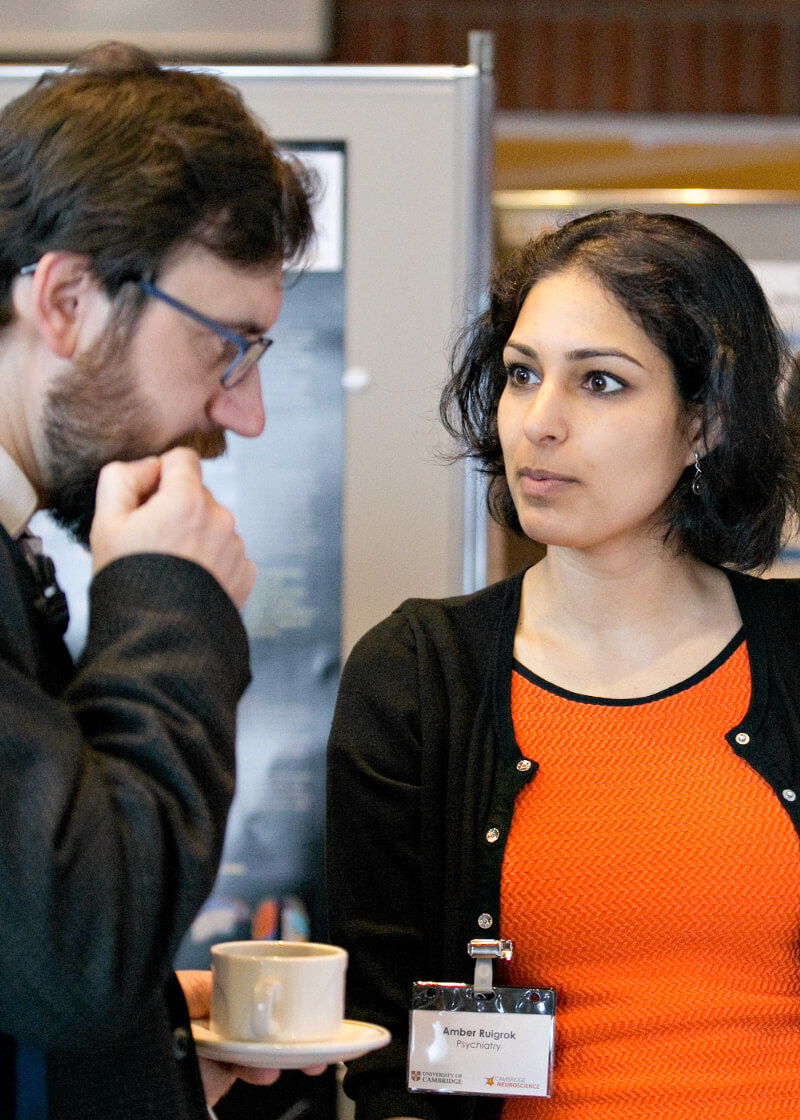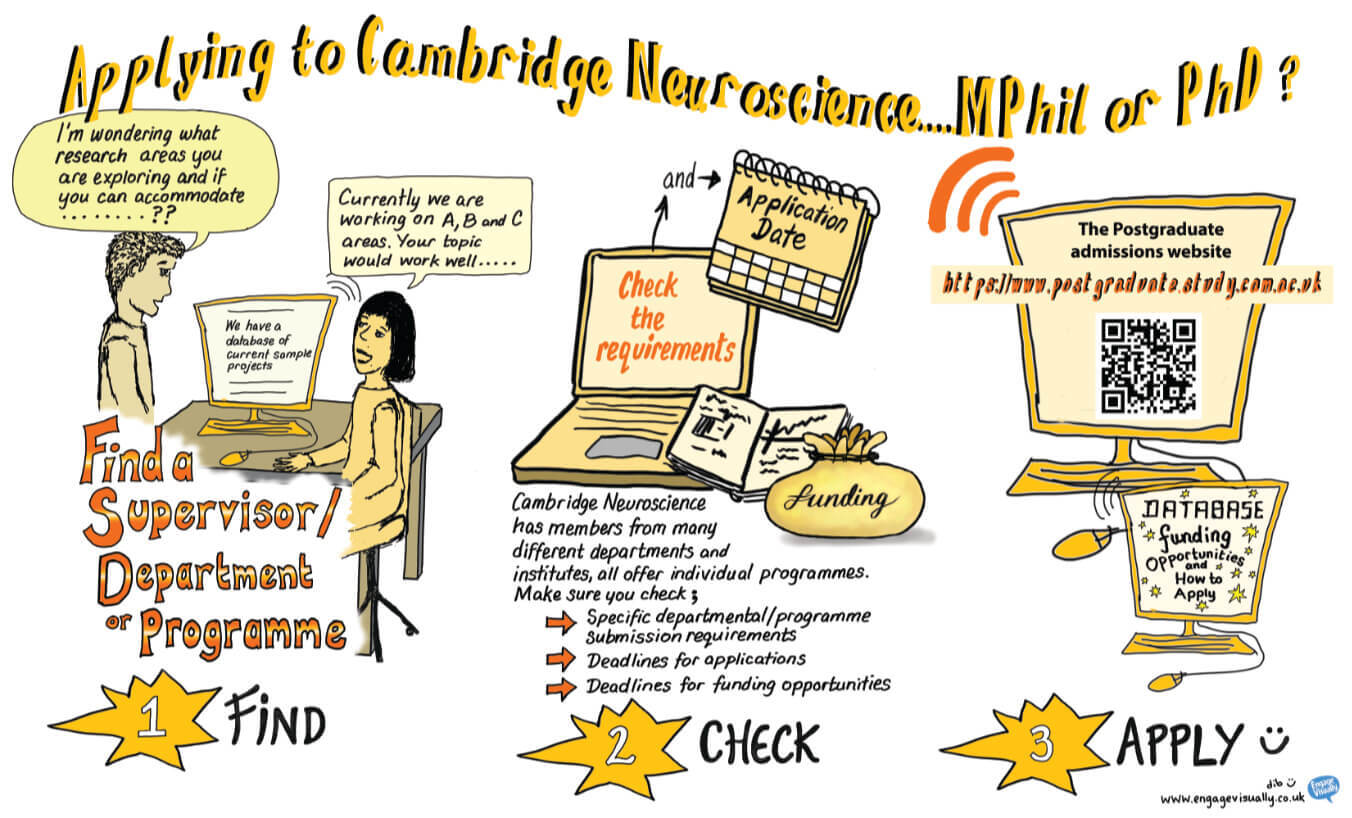Postgraduate Training in Cambridge
Cambridge has excellent opportunities for those wishing to embark on a career in neuroscience. Cambridge provides a stimulating and supportive environment for Postgraduate Students. There is a carefully monitored research supervision system, and a wealth of seminars and other research-oriented teaching available to students. There is no single Department of Neuroscience at the University of Cambridge but it is possible to do a neuroscience-focused post graduate degree at more than 30 Departments and Institutes across Cambridge Neuroscience. The Postgraduate School of Life Sciences has details of both Masters and PhD courses in the sciences and you can find information on more neuroscience-specific courses here.
Masters or MPhil Programmes in Cambridge
These are generally 1 year programmes and are predominantly research based, although some offer both taught and research components, including our inter disciplinary MPhil programme the Cambridge Neuroscience MPhil in Basic and Translational Neuroscience.
Search our list of current MPhil Programmes

PhD Programmes in Cambridge
In Cambridge, students currently do not spend an extended period conducting research projects in different labs or taking courses in a large range of fields. Instead, you will begin research work at the start under the guidance of your supervisor, attending lectures tailored to your individual requirements that are relevant to your chosen field and general principles of experimental design and analysis. Cambridge Neuroscience has members from many different departments and Institutes, all of which offer individual postgraduate programmes so it is worthwhile investigating if there are any specific departmental/programme submission requirements. Most programmes are 3-4 years full time (or 5-7 years part time).
Before you apply for a PhD in Cambridge, we would advise that you contact potential PhD supervisors in your field of interest to discover whether your research can be accommodated in the supervisor’s laboratory. Potential neuroscience supervisors can be identified by searching our directory. If their email is not listed, check their departmental listing. There are different postgraduate programmes available in >30 Departments and Institutes across Cambridge Neuroscience. Your potential supervisor may be linked to a specific postgraduate training programme.
Once you have identified a potential supervisor, a formal application via the Postgraduate admissions website can be made.
Search our list of current PhD ProgrammesAvailable Sample Projects in Cambridge
A full list of postgraduate courses offered at The University of Cambridge can be found here.
Search our available sample projects

MPhil or PhD?
- Find a Supervisor/Department or Programme that you are interested in.
Before you apply for a PhD in Cambridge and if you have a specific project in mind, we would advise that you contact potential PhD supervisors in your field of interest to discover whether your research can be accommodated in the supervisor’s laboratory.
Search our list of current Programmes
- Check Departmental/Institute/Programme requirements and application deadlines
Cambridge Neuroscience has members from many different departments and Institutes, all of which offer individual programmes, so it is worthwhile investigating if there are any specific departmental/programme submission requirements. Make sure you check deadlines for application (varies by Department/Institute/Programme) and deadlines for funding opportunities.
- Funding Opportunities and details on how to apply
The Postgraduate admissions website provides details on how to apply to Cambridge (courses, funding, fees, Colleges etc).
- Contact your referees
You will need two academic references to support your application, and you will need to submit your referees details via the Applicant Portal. Your referees will then receive an automated reference request. You should ensure you already have their consent before you apply.
- Make a formal application
Once you have identified a potential supervisor and ensured that you meet the entry requirements, written your application and uploaded all required supporting documents, a formal application via the Postgraduate admissions website can be made.
Why Cambridge Neuroscience?
We are a diverse and vibrant cross school Interdisciplinary Research Centre at the University of Cambridge. In Cambridge Neuroscience, we are removing traditional boundaries between basic and translational neuroscience and across research disciplines, employing cross-cutting themes with the aim of extending and supporting existing collaborations as well as inspiring new ones across the breadth of neuroscience in Cambridge.
Cambridge Neuroscience comprises >850 first class researchers (including >350 post graduate students), from >30 Departments/Institutes, from a wide range of expertise working in everything from biomedicine and maths, to psychiatry and philosophy, education, engineering and economics. Find out more about our vision here.

You will also have the opportunity to join CamBRAIN, our Early Career Researcher society, committed to fostering collaboration and communication amongst its members, appreciating the diversity of research and interests that fall under the umbrella of this rapidly expanding and exciting field of neuroscience. In addition, to academic talks, presentations and workshops intended for personal/career development, CamBRAIN runs a series of social and public engagement events which allow our members to share experiences and build successful networks. Find out more about CamBRAIN here.
№ 2
in the QS World University Rankings 2023, the highest rated institution in the UK
№ 2
in the Complete University Guide 2023
TOP 10
Cambridge is one of the top ten universities most often targeted by largest number of top employers
(The Graduate Market in 2023)
TOP 2
for academic and employer reputation
(QS World University Rankings 2023)
140+
countries represented among undergraduates and postgraduates
What some of our students say?
What I love about studying within Cambridge Neuroscience is how connected people are. Despite neuroscience being spread across so many departments, I’ve got to know people from Chemistry, Engineering, Zoology – you name it! The work going on across neuroscience is vast and diverse, and it’s great that so much effort is made for us to share this with each other in a way that is accessible to neuroscientists of different backgrounds.
Ailie McWhinnie, current PhD studentCambridge Neuroscience has provided so many excellent opportunities to meet other neuroscientists from across the university and workshops to develop researcher skills. I would recommend Cambridge for a postgraduate programme because of the world-class research, the multitude of opportunities for development and great atmosphere!
Katharina Zühlsdorff, PhD Graduate 2023Information for Prospective Students
Want more information on our MPhil Programme in basic and translational neuroscience?
Contact
For enquiries about a specific programme, please contact the relevant Departmental/Institutional postgraduate administrator listed in the database.


